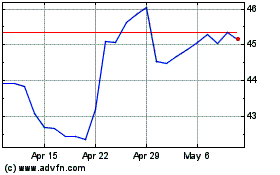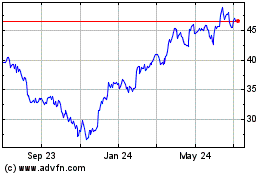Today's Top Supply Chain and Logistics News From WSJ
October 03 2017 - 6:49AM
Dow Jones News
By Paul Page
Sign up: With one click, get this newsletter delivered to your
inbox.
Celadon Group Inc.'s turnaround plan is hitting new hurdles. The
troubled trucking business says it is facing a Securities and
Exchange Commission investigation, the WSJ's Cara Lombardo reports,
even as it takes on $22.6 million in new debt and tries to pare
down to its core truckload operations. There are no details on the
securities probe but it follows long-running problems in Celadon's
truck leasing business and an ambitious expansion plan that spread
the company too thin. Celadon sold its flatbed operation last month
and also shed its Quality Companies leasing unit. New Chief
Executive Paul Svindland, a turnaround specialist brought in to
rebuild the business, says Celadon is showing important
improvements in the foundation trucking operation, where it's
helped by strong demand and pricing across the U.S. shipping
market. But the securities investigation, along with several
shareholder lawsuits, will put more pressure on Celadon during what
looks like a critical period for its survival.
Autonomous transportation technology is making inroads in some
of the world's biggest industrial operations. Mining giant Rio
Tinto PLC says it just completed a a pilot run spanning nearly 62
miles with trains operated from hundreds of miles away, the WSJ's
Robb M. Stewart writes, suggesting miners and their providers have
solved problems that have dogged driverless-equipment plans.
Driverless mining vehicles promise greater efficiency for an
industry that continues to target costs: Rio Tinto uses some 200
locomotives to haul ore from 16 mines to four ports, and it hopes
trains with its AutoHaul technology eventually will run
continuously without shift changes. But testing of trains and
driverless trucks has been plagued by problems such as software
glitches. Rio Tinto's success this week highlights the near-term
potential of autonomous transportation technology in "closed-loop"
systems where vehicles won't have to move in bigger and more
unpredictable transport networks.
Tesla Inc.'s supply chain for the new Model 3 sedan is charging
up very slowly. The Silicon Valley electric-car maker built just
260 of its new automobile in the third quarter, the WSJ's Tim
Higgins reports, with "production bottlenecks" undercutting Tesla's
plans to move 1,500 Model 3s to the market. That's a blow to a
business that hopes to use the car priced well below its luxury
autos to transform itself into a more mainstream player around the
world. Investors have applauded the vision, driving up Tesla's
share price, but the company has had trouble getting its production
to match its ambitions. Tesla said in a statement, "there are no
fundamental issues with the Model 3 production or supply chain."
But the trail-blazing company is seeing competition with bigger
production capabilities come up from the rear. Tesla could lose
consumers' attention if it can't fix its manufacturing bottlenecks
before manufacturers with broader supply chains rev up those
operations.
SUPPLY CHAIN STRATEGIES
Detroit's largest auto makers are putting their weight more
heavily behind the push to electric vehicles. General Motors Co. is
ramping up aggressive plans that will include two more electric
vehicles in the U.S. over the next 18 month while Ford Motor Co. is
putting together a team to explore partnerships with suppliers and
other companies. Along with new mandates from China to boost
electric-car production there, the moves suggest a bigger and more
global supply chain for electric vehicles is starting to form, the
WSJ's Mike Colias writes, as traditional car companies respond to
tougher emissions regulations that go after internal combustion
engines powered with fossil fuels. GM and Ford are investing
billions of dollars in electric vehicles despite challenges turning
a profit. That's because of tepid consumer demand and high
technology costs. GM is forecasting a long transition period, but
the costs are likely to decline as research advances and cheaper
prices at dealerships may accelerate the push toward
production.
QUOTABLE
IN OTHER NEWS
U.S. factory-sector activity expanded for the 13th straight
month in September, to its highest reading since May 2004.
(WSJ)
A measure of business confidence in Japan rose to a 10-year
high. (WSJ)
Britain's Monarch Airlines Ltd. declared bankruptcy and ceased
passenger operations. (WSJ)
Canadian grocery giant Metro Inc. is buying drugstore chain Jean
Coutu Group Inc. for $3.59 billion. (WSJ)
Raymond James analysts lowered their price target for Alibaba
Group Holding Ltd. because of the company's new logistics
investment. (Barron's)
Shipping prices for large tankers have been soaring as traders
try to move crude ahead of China's Golden Week slowdown.
(Platts)
Nucor Inc. Chief Executive John Ferriola says the White House
has assured him the administration will impose new tariffs on steel
imports. (Bloomberg)
Coca-Cola is buying Topo Chico, a Mexican mineral water brand
with a cult following in Texas. (Dallas Morning News)
The American Trucking Associations wants the White House to
maintain the U.S. cross-border trucking program with Mexico. (Fleet
Owner)
Imported containers into the Port of New York and New Jersey
rose 5.4% in August. (American Shipper)
Japan's Yamato Holdings Ltd. will add labor-saving technology
and other improvements to make employees' jobs easier as volume
surges. (Nikkei Asian Review)
The United Nations found Egypt tried to smuggle in weapons
bought from North Korea and hidden in an iron ore freighter.
(Washington Post)
CMA CGM SA is buying South Pacific regional operator Sofrana
Unilines. (World Maritime News)
U.S.-listed Euroseas is exploring merging its growing container
ship fleet with that of fellow Greece-based owner Poseidon
Container Holdings. (Lloyd's List)
The Port of Oakland will build an $11 million rail spur to a
perishables facility at the port. (Logistics Management)
Volkswagen AG will stop exporting finished vehicles from Russia.
(Automotive Logistics)
China will run several more freight trains between northwest
China and Tehran this year after launching the service. (Financial
Tribune)
United Parcel Service Inc. is preparing to open a
770,000-square-foot distribution center at the Port of Tacoma,
Wash. (KIRO)
European producers of electronic bikes complained to the
European Commission against cheap Chinese imports. (The
Independent)
China is cracking down on "daigou" business that buy goods in
Hong Kong and ship them to end users in mainland China. (South
China Morning Post)
ABOUT US
Paul Page is deputy editor of WSJ Logistics Report. Follow him
at @PaulPage, and follow the entire WSJ Logistics Report team:
@brianjbaskin , @jensmithWSJ and @EEPhillips_WSJ. Follow the WSJ
Logistics Report on Twitter at @WSJLogistics.
Write to Paul Page at paul.page@wsj.com
(END) Dow Jones Newswires
October 03, 2017 06:34 ET (10:34 GMT)
Copyright (c) 2017 Dow Jones & Company, Inc.
General Motors (NYSE:GM)
Historical Stock Chart
From Mar 2024 to Apr 2024

General Motors (NYSE:GM)
Historical Stock Chart
From Apr 2023 to Apr 2024
